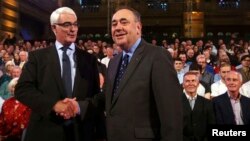Two of Scotland's leading politicians began a final TV debate on Monday night, just weeks before a historic independence referendum, with secessionists looking for a game-changing performance to catch up in the polls.
As the Sept. 18 vote nears, polls show the campaign to sever Scotland's 307-year union with England and leave the United Kingdom is trailing in support, as it has been from the start.
Several recent polls have shown support for independence climbing a few points, but the most recent “poll of polls,” on Aug. 15, which is based on an average of the last six polls and excludes undecided respondents, found support for a breakaway stands at 43 percent against 57 percent for staying in the UK.
But expectations were riding high for the second of two live TV debates with Alex Salmond, 59, leader of the pro-independence Scottish National Party (SNP), enjoying a reputation as a canny campaigner who has unexpectedly won elections in the past.
“This is our time, our moment. Let us do it now,” Salmond told the audience in an emotional opening statement, urging Scots to vote for full independence.
The TV debate is expected to center on three issues: if and how an independent Scotland could keep the pound, how many barrels of oil are left in the North Sea, and whether Scotland's publicly-funded health service would be better off in a breakaway state.
Salmond unexpectedly failed to dominate the first debate on Aug. 5, in which Alistair Darling, the leader of the anti-independence “Better Together” campaign, put him on the spot over the issue of currency in an independent Scotland.
Fundamental Question
Darling told voters on Monday night that choosing full independence and taking Salmond at his word was too risky a prospect.
“He's asking us to take his word for it. Well, I'm sorry I can't,” said Darling.
Darling criticized Salmond for failing to spell out a “plan B” if the British government refused to formally share the pound in a currency union, the nationalists' preferred option.
All three major U.K.-wide parties have ruled out such a union, but Salmond predicts their position will change if there's a “yes” vote in September .
Bookmaker Ladbrokes has Salmond as the favorite again before Monday's debate, but he is less heavily touted this time.
A spokesman for the pro-independence “Yes Scotland” campaign said the debates were important because they reached a large audience but emphasized the breadth of the movement's grassroots campaign, which he said gave it an edge.
Douglas Alexander, the Labor party's foreign affairs spokesman and an opponent of independence, said the nationalist campaign was in trouble with just weeks to the vote.
“For them to be in a position with just days to go until postal ballots drop where they cannot answer the most fundamental question in relation to what currency Scotland would use ... is genuinely not where they expected to be,” he said.
The debate, being held in an art gallery in Glasgow, was shown live on the BBC.





